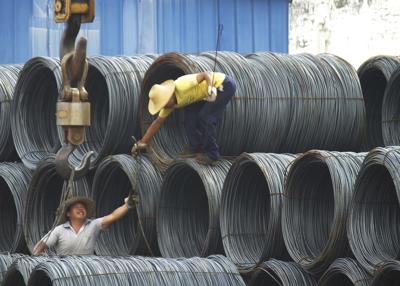Last spring, Louisiana officials unveiled a major foreign investment project in the state: A $1.12 billion manufacturing complex by Chinese chemical giant Wanhua. That project's now caught in the middle of a trade war between the U.S. and China and other countries.
Although Wanhua has not yet made a final investment decision or named a specific Louisiana site, it is a stark example of the risks economists say face Louisiana because of escalating trade wars with some of the stateās biggest trading partners.
āWeāre likely to face a significant increase in costs that were not part of the original capital investment, which raises concerns for our project,ā said James Newport, general manager of Wanhua Chemical U.S. Operations LLC. He added the firm is seeking an exemption from the tariffs.
The company is āreevaluatingā the project on the basis of ātens of millionsā in higher costs resulting from steel and aluminum tariffs imposed by the Trump administration.Ā
The Trump administration tacked tariffs on steel and aluminum imports from China, Mexico, Canada and a host of other countries earlier this year.
Early Friday, the U.S. hit China in specific with 25 percent tariffs on $34 billion worth of other imports; China retaliated with tariffs on $34 billion worth of U.S.-made products. Tariffs on another $16 billion ā and possibly hundreds of millions more ā from both countries are looming in the coming weeks and months if the battle escalates.
Already farmers and port officials in Louisiana are worried because of agricultural products, particularly soybeans, being targeted by China that are grown in the state or shipped through its ports from other states.
āLouisiana is set to be the hardest-hit state from proposed tariffs overall, with the vast majority of that impact coming from soybeans,ā St. Gabriel Mayor Lionel Johnson told reporters Friday. āNot because we are a top soy-producing state, but because we are the gateway port for the product to the rest of the world, and China is the largest destination.ā
Louisiana has the largest trade surplus with China of any state in the country, according to a Bloomberg report last year. Several studies have pegged Louisianaās reliance on trade, and its risk given a trade war, as among the highest in the nation. A report from the U.S. Chamber of Commerce out this week found the impact on Louisiana by the Trump administrationās tariffs is exceeded only by Texas.
Officials at the Port of New Orleans and Port of South Louisiana say it is still too early to gauge the impact of the escalating trade disputes.
But the Port of South Louisiana, the nationās largest port by tonnage with grain elevators and industrial complexes located within its jurisdiction, exports 60 percent of the grain, including soybeans, leaving the U.S., according to Paul Aucoin, the portās executive director.
āAre we concerned about the tariffs? Sure we are. Weāre very concerned. We need to be concerned,ā he said.
But Aucoin said it is too early to tell how the disputes will play out, and noted some are optimistic China wonāt be able to fulfill its soybean demand from places like Brazil without continuing to tap the U.S. market.
Still, if Louisiana loses out on even a fraction of its exports, Aucoin warned the effects could be lasting.
āOnce you lose them, how do you get them back? Do we ever get them back?ā he said.
For its part, Wanhua is building key parts of its plant in China out of steel and plans to ship them to Louisiana for assembly, which is why the tariffs will hit the project, Newport said. The Chinese parent company is licensing its technology to the U.S. subsidiary, Newport said. Because the firm's technical expertise is located in China, that's where the construction is taking place rather than in the U.S.Ā
Wanhua would be the second Chinese firm to locate a major industrial plant in Louisiana, after Yuhuang Chemicalās St. James Parish methanol complex.
Greg Bowser, president of the Louisiana Chemical Association, said more projects from Asian firms are on the drawing board, and a trade war with China puts the stateās delicate relationship with the country at risk.
āIf it ends up being a trade war, my industry, I donāt think we win that,ā Bowser said.
Louisiana has experienced a boom in industrial projects in recent years, as the shale-drilling revolution fueled petrochemical and liquefied natural gas projects along the Mississippi River and in the Lake Charles region. China, one of the most important markets for the LNG export facilities in Louisiana, has not yet tacked tariffs on LNG imports to the country.
Louisiana Economic Development Secretary Don Pierson said Louisiana still has geographical advantages because of its proximity to ports and major waterways, and he doesn't expect steel and aluminum tariffs to drive mega-projects away. LED has talked with international companies thinking about investments here, he added, and he's not seeing signs of decreased interest.Ā
"The uncertainty is not helpful, but there's no indications it's causing a wave of reconsideration," he said.




